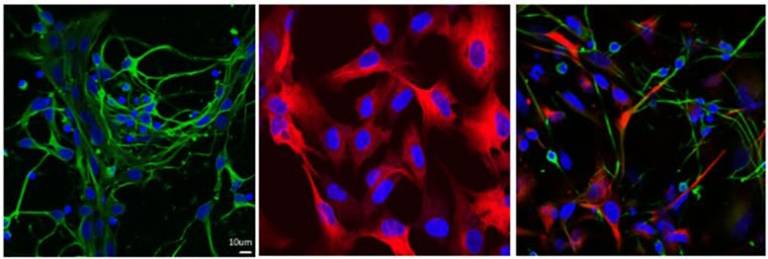MDC Publication Highlights - September 2018
2 October 2018
September 2018 MDC publications: Molecular events initiating Parkinson’s, neural mechanisms of decision-making, reviews on neural vulnerability in neurodegeneration, Dystonia & Paroxysmal Dyskinesias

Molecular mechanisms initiating Parkinson’s disease
Despite a growing understanding of the biological mechanisms associated with Parkinson’s disease, little is known about the initial molecular events causing the disease. Questions such as why do dopaminergic neurons are particularly vulnerable and which of the known pathological molecular phenomena (such as inflammation, oxidative stress and aggregation of the alpha-synuclein protein) begins the pathological cascade are largely unanswered. In the current article, a team of researchers from UCL and University of Cambridge used a combination of genetic and molecular methods to uncover the early molecular events that may initiate and cause Parkinson’s disease. The researchers found that cells in the substania nigra preferentially express a particular receptor called TLR4 which shows strong genetic association with Parkinson’s disease. They further found that TLR4 causes cells to be more sensitive to the alpha-synuclein protein and to generate a stronger inflammatory response in its presence, leading to neuronal death. Taken together, the results of the study suggest that the TLR4 pathway is a pivotal step in the initiation of Parkinson’s disease and that blocking TLR4 activity may be protective against neuronal death.
Hughes et al. ‘Picomolar concentrations of oligomeric alpha‑synuclein sensitizes TLR4 to play an initiating role in Parkinson’s disease pathogenesis’. Acta Neuropathologica, First published: 17 September 2018. doi.org/10.1007/s00401-018-1907-y
Neural mechanisms of decision-making in the prefrontal cortex
People and animals are continuously faced with choices in everyday life: be it people trying to decide which brand of cereal to buy at the supermarket or monkeys trying to decide which tree to climb while foraging for food. Making a decision requires the integration of several cognitive processes, including shifting attention between the different alternatives, comparing the relative benefits (value) of each alternative and making a choice. A team of UCL researchers set out to understand which brain regions are responsible for these different processes and how they interact to form a decision and guide behaviour. The researchers recorded neuronal activity from different regions of the pre-frontal cortex (PFC) during decision-making tasks. They found that distinct regions of the PFC are responsible for different components of the decision-making process and these work in parallel to guide behaviour. The results provide a unifying account of how the PFC supports decision-making based on perceived value.
Hunt et al. ‘Triple dissociation of attention and decision computations across prefrontal cortex'. Nature Neuroscience 21, October 2018. doi.org/10.1038/s41593-018-0239-5
Biological mechanisms of selective neuronal vulnerability in neurodegenerative diseases
In a Nature Neuroscience special focus issue on neurodegenerative disease, UCL MDC researcher Prof John Hardy, together with colleagues from Columbia University Medical Center, address one of the fundemental questions in the field of neurodegenerative diseases: why do proteins that usually show widespread expression accumulate in one specific set of cells while sparing others? The authors review how recent developments in whole-genome technologies, neurodegenerative disease mouse models and growing understanding of morphological, electrophysiological, and biochemical properties of vulnerable cells help shed light on the biological basis of selective neuronal vulnerability in conditions such as Alzheimer’s disease, Parkinson’s disease, Amyotrophic lateral sclerosis, Frontotemporal dementia and Huntington’s disease.
Fu, Hardy & Duff. ‘Selective vulnerability in neurodegenerative diseases'. Nature Neuroscience 21, October 2018. doi.org/10.1038/s41593-018-0221-2
Dystonia
Dystonia is a neurological condition characterized by abnormal involuntary movements or postures that are caused by sustained or intermittent muscle contractions. In this disease primer, Prof. Kailash Bhatia and colleagues present a comprehensive review of the epidemiology, genetics, biological mechanism, diagnosis, classification and clinical management of dystonia.
Balint et al. ‘Dytonia’. Nature Reviews Disease Primers 4, First published: 20 September 2018. doi.org/10.1038/s41572-018-0023-6
Unravelling paroxysmal dyskinesias
Paroxysmal dyskinesias (PxD) is a general term for a group of rare and different disorders characterized by recurrent episodes (attacks) of abnormal movements, typically dystonia, chorea or both, without loss of consciousness. In the current article, MDC clinician and researcher Prof. Kailash Bhatia and Colleague Dr. Roberto Erro present a new conceptual framework for paroxysmal dyskinesias. The authors review the current definition and classification of PxD and the different genetic and non-genetic conditions that present with PxD and then describe a new diagnostic framework for PxD whose primary goal is to guide optimal treatment and clinical management.
Erro & Bhatia, ‘Unravelling of the paroxysmal dyskinesias’. J Neurol Neurosurg Psychiatry, First published: 21 September 2018. dx.doi.org/10.1136/jnnp-2018-318932
 Close
Close

